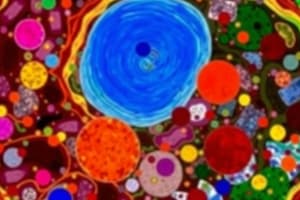Podcast
Questions and Answers
What is the basic unit of life?
What is the basic unit of life?
Cells
What are the three parts of the cell theory?
What are the three parts of the cell theory?
- All living things are composed of cells. 2. Cells are the basic unit of structure and function. 3. All cells come from pre-existing cells.
Who disproved the theory of spontaneous generation?
Who disproved the theory of spontaneous generation?
Francesco Redi
Who proposed the germ theory?
Who proposed the germ theory?
Who discovered that all plants are made of cells?
Who discovered that all plants are made of cells?
Who discovered that all animals are made of cells?
Who discovered that all animals are made of cells?
Who stated that all cells come from pre-existing cells?
Who stated that all cells come from pre-existing cells?
Who coined the term "cell"?
Who coined the term "cell"?
Which type of cell is round and carries oxygen to the body and carbon dioxide back to the lungs?
Which type of cell is round and carries oxygen to the body and carbon dioxide back to the lungs?
Which type of cell is long and striped, stabilizing and moving body parts?
Which type of cell is long and striped, stabilizing and moving body parts?
Which type of cell is layered and provides protection against the outside environment?
Which type of cell is layered and provides protection against the outside environment?
Which of these cell types is a prokaryote?
Which of these cell types is a prokaryote?
Prokaryotic cells have a nucleus.
Prokaryotic cells have a nucleus.
Eukaryotic cells have organelles.
Eukaryotic cells have organelles.
Prokaryotes are smaller than eukaryotic cells.
Prokaryotes are smaller than eukaryotic cells.
All cells have ribosomes.
All cells have ribosomes.
Prokaryotes have a cell membrane.
Prokaryotes have a cell membrane.
Which organelle is responsible for breaking down old cell parts?
Which organelle is responsible for breaking down old cell parts?
Which organelle is responsible for packaging and processing proteins?
Which organelle is responsible for packaging and processing proteins?
Which organelle is responsible for generating energy for the cell?
Which organelle is responsible for generating energy for the cell?
What are the four main cell processes?
What are the four main cell processes?
Match the cell processes with their respective descriptions.
Match the cell processes with their respective descriptions.
Flashcards
Cell Theory
Cell Theory
States that all living things are made of cells, cells are the basic unit of structure and function, and all cells come from pre-existing cells.
Spontaneous Generation
Spontaneous Generation
The disproven idea that living things can arise from non-living matter.
Prokaryotic Cell
Prokaryotic Cell
A simple cell type, small, lacking a nucleus and membrane-bound organelles; unicellular.
Eukaryotic Cell
Eukaryotic Cell
Signup and view all the flashcards
Cell
Cell
Signup and view all the flashcards
Organelle
Organelle
Signup and view all the flashcards
Cell Membrane
Cell Membrane
Signup and view all the flashcards
Cell Wall
Cell Wall
Signup and view all the flashcards
Nucleus
Nucleus
Signup and view all the flashcards
Cytoplasm
Cytoplasm
Signup and view all the flashcards
Mitochondria
Mitochondria
Signup and view all the flashcards
Lysosome
Lysosome
Signup and view all the flashcards
Cellular Respiration
Cellular Respiration
Signup and view all the flashcards
Ribosomes
Ribosomes
Signup and view all the flashcards
Vesicle
Vesicle
Signup and view all the flashcards
Biosynthesis
Biosynthesis
Signup and view all the flashcards
Nucleoid
Nucleoid
Signup and view all the flashcards
Centrioles
Centrioles
Signup and view all the flashcards
Study Notes
Cytology Unit Part I
- Cytology is the study of cells.
- A cell is the basic unit of life.
- Cells form tissues.
- Tissues form organs.
- Organs form organ systems.
- Organ systems form organisms.
The Cell Theory
- All living things are composed of cells.
- Cells are the basic unit of structure and function.
- All cells come from pre-existing cells.
The People Behind The Cell Theory
- Redi: Disproved spontaneous generation, showing life doesn't arise from non-living matter.
- Pasteur: Proposed the germ theory.
- Schleiden: All plants are made of cells.
- Schwann: All animals are made of cells.
- Virchow: All cells come from pre-existing cells.
- Hooke: Coined the term "cell".
The Structure of a Cell Dictates its Function
- Blood cells: Round, large surface area (SA), carry oxygen (O2) from lungs to body and carbon dioxide (CO2) back to lungs.
- Muscle cells: Long, striped, stabilize and move body parts.
- Skin cells: Layered, protect and act as a barrier against the environment.
Prokaryotes vs. Eukaryotes
- Prokaryotes: Simple, small, no nucleus, unicellular (one cell), no organelles (e.g., bacteria, archaea).
- Eukaryotes: Complex, larger, have a nucleus, multicellular (many cells), have organelles (e.g., humans, plants, fungi).
- Both types of cells contain DNA, ribosomes, a cell membrane, and cytoplasm.
Cell Organelles
- Organelles are tiny structures within a cell, acting like "little organs".
- Different types of cells contain different organelles.
Cell Processes
- Nutrition: Taking substances into the body and cells.
- Organelles responsible: Cell membrane and vesicles.
- Digestion: Breaking down food into smaller molecules.
- Organelles responsible: Lysosomes.
- Excretion: Removing waste materials.
- Organelles responsible: Lysosomes and cell membrane.
- Secretion: Releasing substances that influence other cell activities.
- Organelles responsible: All organelles.
- Absorption: Taking in nutrients and water molecules.
- Organelles responsible: Cell membrane and vesicles.
- Respiration: Process where cells break down food to release energy.
- Organelles responsible: Mitochondria.
- Biosynthesis: Breaking down old cell parts to make new cell parts.
- Organelles responsible: Lysosomes.
- Response: A reaction to a stimulus.
- Organelles responsible: All organelles.
- Reproduction: The division of cells (mitosis and meiosis).
- Organelles responsible: Nucleus and centrioles.
Studying That Suits You
Use AI to generate personalized quizzes and flashcards to suit your learning preferences.




